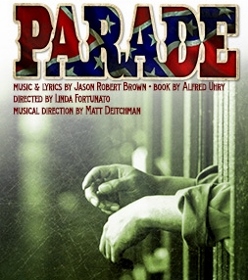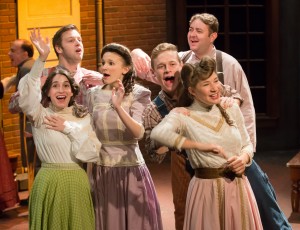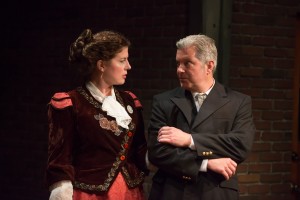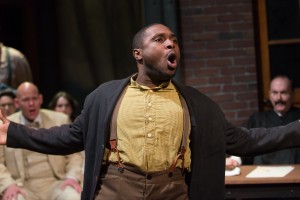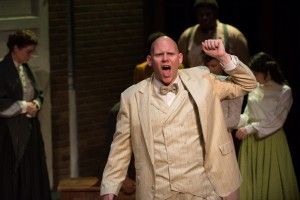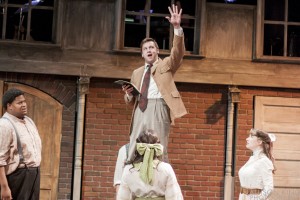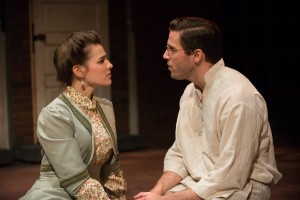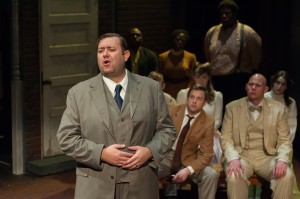IN SOME WAYS, THIS PARADE PASSED ITSELF BY
First performed in Chicago by Bailiwick Repertory, now dutifully revived by BoHo Theatre, the potentially pile-driving Parade by bookwriter Alfred Uhry and composer/lyricist Jason Robert Brown reprises an ugly and evergreen tragedy. Their driven musical chronicles the reflexive racism that, a century ago, doomed a suspect stranger. Here the bigotry is anti-Semitism, a xenophobia that ironically unites blacks and whites in a feeding frenzy. The witch hunt ends with the lynching of Leo Frank, a Brooklyn-born Jew in 1914 Atlanta. The title sardonically refers to the Memorial Day Parade that was backdrop to a civic disgrace fueled by fear, ignorance and scapegoating.
Reluctantly journeying to Georgia to manage a pencil firm, detesting the crackers who surround him, Frank is immediately accused of rape and murder when the body of 13-year-old factory worker Mary Phagan (Peyton Tinder) is found on this horror-filled holiday. The case against him is circumstantial at best—but it’s much stronger against Jim Conley (Eric A. Lewis), the plant’s black janitor whose perjury will help to convict Frank. Of course, prosecutor Hugh Dorsey (Scott Danielson) could indict the real killer. But that’s too easy: He has bigger fish to fry. Hanging an innocent Jew will garner more publicity than convicting a guilty black man—a virtual cake walk in Jim Crow Georgia.
Spurred on by a vitriolic, circulation-boosting newspaper campaign and by fundamentalist Christians reviling this “Christ killer,” Dorsey suborns witness testimony, turning the trial into a Kafkaesque kangaroo court. Frank, whose disdain for the proceedings is taken as proof of guilt, receives no palpable defense. Incredibly, according to Georgia law, this sacrificial innocent is denied the right to defend himself, other than to make an impassioned plea that arrives too late to melt hard hearts.
Condemning the lone victim is a ton of toxic testimony—lies from Mary’s supposed boyfriend, tearful accusations by her mother, and prevarications from the shop girls about Leo’s craving for Christian virgins. Leo gets conditional support from his frightened but stalwart wife Lucille (Sarah Bockel), a Southerner who suddenly sees the darkness of Dixie, and from Governor John Slaton (Russell Alan Rowe), uncomfortable with the trial’s rush to judgment and the torrent of national criticism triggered by a sanctioned hate crime (his idea of mercy is to commute the sentence from hanging to life imprisonment).
Inspired by a score that ranges from soaring anthems (“The Dream of Atlanta”) to ragtime romps (“Pretty Music”), Matt Deitchman’s musical direction does rich justice to Brown’s supple songs. BoHo’s attractive, 15-member ensemble, better with notes than words, honor every number with full-throated ardor and combustible conviction.
But Linda Fortunato’s direction is problematic. Parade works both as an embattled love story (the scenes between Leo and Lucille are the show’s strongest) and a protest against kneejerk intolerance festering into lawless vengeance. But at Theater Wit, the musical’s depiction of a tested marriage outweighs any rage over the travesty of justice.
Perhaps to show how fatefully Leo underestimates his enemies, Jim Deselm portrays him as more discomposed than furious or frightened at this sudden evil. It’s a bad choice. His duet “This Is Not Over Yet” with Bochel’s anguished Lucille carries more emotion than his attempts to defend his life. Irritation is a strange way to depict innocence. Anger and fear are so absent that on opening night audience members found it funny when Leo shows the neck lacerations where he tried to hang himself.
The music suggests a passion and urgency that the performances are pressed to match. As such, we see a sadness we don’t always feel.
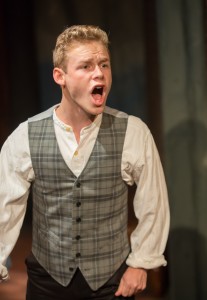 photos courtesy of BoHo Theatre
photos courtesy of BoHo Theatre
Parade
Theater Wit, 1229 W Belmont Ave.
Thurs – Sat at 8; Sun at 2
scheduled to end on November 16, 2014
for tickets, call 773.975.8150
or visit www.BoHoTheatre.com
for info on this and other Chicago Theater,
visit www.TheatreinChicago.com
